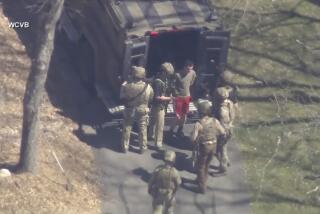Spy Suspect Got $316,000, S.F. Indictment Says
SAN FRANCISCO — Spy suspect Jerry A. Whitworth received $100,000 in June, 1980, from the alleged ringleader of the naval spy ring after Whitworth backed away from plans to quit the Navy, a federal grand jury charged here Monday.
Whitworth, 45, a chief radioman who retired from the Navy in October, 1983, was charged in a single-count indictment of conspiring to pass sensitive military secrets to John A. Walker Jr., knowing that Walker would then pass them to Soviet contacts. Walker, a retired chief warrant officer, was the alleged chief of the spy ring. Whitworth used miniature cameras and home copying machines to photograph and duplicate classified documents and wrote coded messages in letters to Walker, the indictment said.
For the record:
12:00 a.m. June 19, 1985 For the Record
Los Angeles Times Wednesday June 19, 1985 Home Edition Part 1 Page 2 Column 1 Metro Desk 1 inches; 28 words Type of Material: Correction
The Times mistakenly reported on Tuesday the amount of money allegedly received by accused spy Jerry A. Whitworth in exchange for passing classified documents. He is accused of receiving $328,000.
The $100,000 figure marks the first time that the FBI has reported that a single payment to any member of the alleged spy ring had exceeded $35,000. The San Francisco indictment detailed 15 payments by Walker to Whitworth between 1975 and 1982 totaling $316,000.
‘Everybody’s Doing It’
Meanwhile, Laura Walker Snyder, John Walker’s daughter, told a television interviewer that her father almost persuaded her to join in the alleged spying, telling her that “everybody’s doing it.”
“I came that close to agreeing to do the same thing . . . to please my father,” Snyder, 25, said in an interview to be carried today on the Christian Broadcasting Network’s 700 Club program. The interview was shown to some reporters Monday.
In Norfolk, Va., Monday, another grand jury handed down a seven-count indictment against Arthur J. Walker, 50, a retired Navy lieutenant commander, older brother of John Walker and another suspect in the spy ring.
The Norfolk indictment alleged that Arthur Walker turned over to his brother the “damage control book” for the Blue Ridge, one of the Navy’s two amphibious command ships. The book, which John Walker in turn allegedly passed to the Soviets, is a list of procedures for use in repairing Navy vessels.
John Walker and his 22-year-old son, Michael, a sailor on the aircraft carrier Nimitz, were indicted earlier by a federal grand jury in Baltimore. All four men are being held without bail.
Overt Acts Charged
The conspiracy charge against Whitworth alleged 41 overt acts, including meetings with John Walker in such places as Hong Kong, Manila, San Diego and Norfolk. The indictment detailed a dozen meetings allegedly held by John Walker and his Soviet contacts during which, it charged, classified material was passed.
Although officials said that Whitworth received $328,000, only $316,000 was accounted for in the indictment.
The biggest single payment Whitworth allegedly received from Walker--$100,000--occurred in June, 1980. That was the month that Whitworth withdrew his request to resign from the Navy, a request he had made in October, 1979.
He received at least another two payments totaling $110,000 in 1981 and 1982, the indictment said. Included in the payments, it said, was $10,000 which was used to pay for a van for Whitworth.
The indictment said also that Whitworth quit the Navy for about two months in 1974. From the time of his re-enlistment in October, 1974, until his final retirement in October, 1983, Whitworth had a top secret security clearance.
He was at various times custodian of secret documents, had access to naval deployment plans, was responsible for installing communications systems and was a satellite communications specialist.
Pentagon officials have said that the spy ring caused a “serious loss” of Navy secrets. The Norfolk indictment against Arthur Walker alleged, for the first time, that the spy ring’s operation included classified material from the Blue Ridge, described as one of only two Navy ships capable of providing integrated command and control for sea, air and land communications and amphibious assaults.
The indictment said that Arthur Walker photographed the ship’s “damage control book” on Sept. 2, 1981, at an office in Virginia Beach, Va., where John Walker had opened a detective agency. It said also, as FBI affidavits had disclosed previously, that Arthur Walker turned over to his brother on April 28, 1982, confidential Navy messages on malfunctioning equipment on helicopter carriers.
The Norfolk indictment described John Walker as “a representative, officer, agent and employee” of the Soviet Union and said that Arthur Walker gave him “documents, writings, plans, blueprints, photographs, sketches and information relating to the national defense” knowing the data would be delivered to the Soviets.
$12,000 for Documents
Without giving a dollar figure, it said that Arthur Walker “was compensated for his role in the conspiracy.” Earlier, FBI affidavits said Arthur Walker had told agents after his arrest on May 29 that, on one occasion, his brother had given him $12,000 for one set of documents.
Arthur Walker, who like Whitworth is scheduled for arraignment today, retired in 1973 after 20 years in the Navy. An FBI agent testified at a court hearing in Norfolk last week that Arthur Walker took a job in 1980 with VSE Corp., a defense contractor, at the urging of his brother so he could gain access to classified defense documents.
In the television interview, Walker’s daughter, who spent a year on active duty in the Army in 1978 and 1979, said that she did not have access to the type of classified information her father was seeking but that he encouraged her to get a job that would require a tight security clearance.
“It’s a sales pitch. He makes you think that ‘Come on, everybody’s doing it. There’s nothing to it,’ ” Laura Snyder said.
“First he’d break you down and make you feel like the lowest form of life,” she said. “He’d say, ‘You know you’re never going to be successful. Why don’t you let me help you make a lot of money?’ ”
Snyder, who lives in Canton, N.Y., said she believes her father used those manipulative tactics on his son, Michael.
“My father has a very strong personality and my brother is very sensitive and weak and loving,” she said.
Dan Morain reported from San Francisco and Gaylord Shaw reported from Norfolk, Va.
More to Read
Sign up for Essential California
The most important California stories and recommendations in your inbox every morning.
You may occasionally receive promotional content from the Los Angeles Times.










